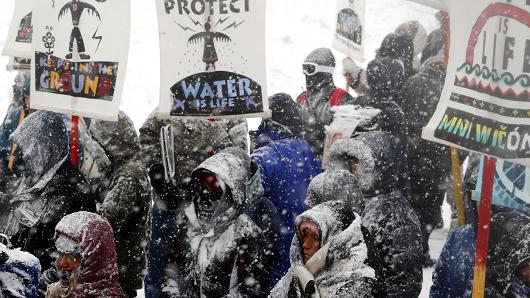A group of U.S. military veterans has vowed to block completion of the hotly disputed Dakota Access pipeline, despite the secretary of the Army giving the project the green light.
"We are committed to the people of Standing Rock, we are committed to nonviolence, and we will do everything within our power to ensure that the environment and human life are respected. That pipeline will not get completed. Not on our watch," said Anthony Diggs, a spokesman for Veterans Stand.
Diggs added that the group hopes to raise enough funds "to have a larger, solid boots-on-the-ground presence."
The secretary of the Army instructed the U.S. Army Corps of Engineers to grant Energy Transfer Partners the easement it needs to complete the final stretch of its $3.7 billion pipeline, Sen. John Hoeven and Rep. Kevin Cramer, both of North Dakota, said Tuesday. President Donald Trump last week signed executive actions to advance construction for Dakota Access and another disputed pipeline.
Veterans Stand has raised $37,000 since launching a GoFundMe campaign last week. Part of that money will go to "basic transport of supplies and personnel," Diggs told CNBC.
The Standing Rock Sioux tribe also on Tuesday vowed to mount a legal challenge claiming the Corps lacks the statutory authority to stop an environment review and issue the easement.
The tribe opposes construction, saying the pipeline passes beneath a source for its drinking water and construction would disrupt sacred land. Their campaign has drawn thousands of protesters to camps near Cannon Ball, North Dakota, in recent months.
To abandon the study "would amount to a wholly unexplained and arbitrary change based on the president's personal views and, potentially, personal investments," the tribe said in a statement.
Trump's financial disclosures show he owned shares of Energy Transfer Partners, the company building the Dakota Access pipeline. Staffers for Trump say he has sold that investment, but that has not yet been confirmed by any further financial disclosures.
It's difficult to argue that the secretary of the Army lacks the authority to grant the easement, said Bruce Huber, an associate professor of law at the University of Notre Dame who specializes in environmental law.
However, any halt to the environmental study will face a high burden proof, he said. That's because the Army's assistant secretary for civil works is on the record as saying other routes should be explored and an environmental study is the best way to do that.
In December, the Corps denied the easement and said the best path forward would be to consider alternative routes for the project by conducting an environmental review with public input and analysis.
"That's an unclear bit of law there, whether the process can simply be terminated," Huber said. "You can bet your bottom dollar it will be litigated."
The Standing Rock Sioux also took issue with Republican lawmakers who claimed the easement had already been granted. The headline on Cramer's statement on Tuesday read, "Approved — Dakota Access Pipeline receives federal easement."
The Indigenous Environmental Network raised concerns that attempts to force through approval would stoke tension at protest camps, where activists have already clashed with law enforcement.
"Instead of following proper legal procedure and completing the Environmental Impact Study, the Army has chosen to escalate an already tense situation, go against their own processes and potentially put people in harm's way," the network said in a statement.
In his statement, Hoeven said various agencies are working to bring in more "federal law enforcement resources to support state and local law enforcement."
The latest flare-up occurred last month when the Morton County Sheriff's Department used foam rubber bullets, pepper spray and smoke canisters to disperse protesters. The activists attempted to enter private property and threw projectiles at authorities, the department said.
A department spokesperson said there are still about 300 people at three camps on or near the Standing Rock reservation.
Last week, Veterans Stand announced plans to support the protesters camped out in North Dakota. Those efforts include a plan to quickly mobilize thousands of U.S. military veterans to return to Standing Rock after about 4,000 traveled there in December.
The presence of veterans among protesters potentially sets up a public relations challenge for the Trump team.
Efforts by activists to boost their presence could be hampered by forecasts for flooding in the region. Numbers have already dwindled due to harsh winter weather.
US veterans group says Dakota Access pipeline 'will not get completed. Not on our watch'

























Laissez un commentaire Votre adresse courriel ne sera pas publiée.
Veuillez vous connecter afin de laisser un commentaire.
Aucun commentaire trouvé